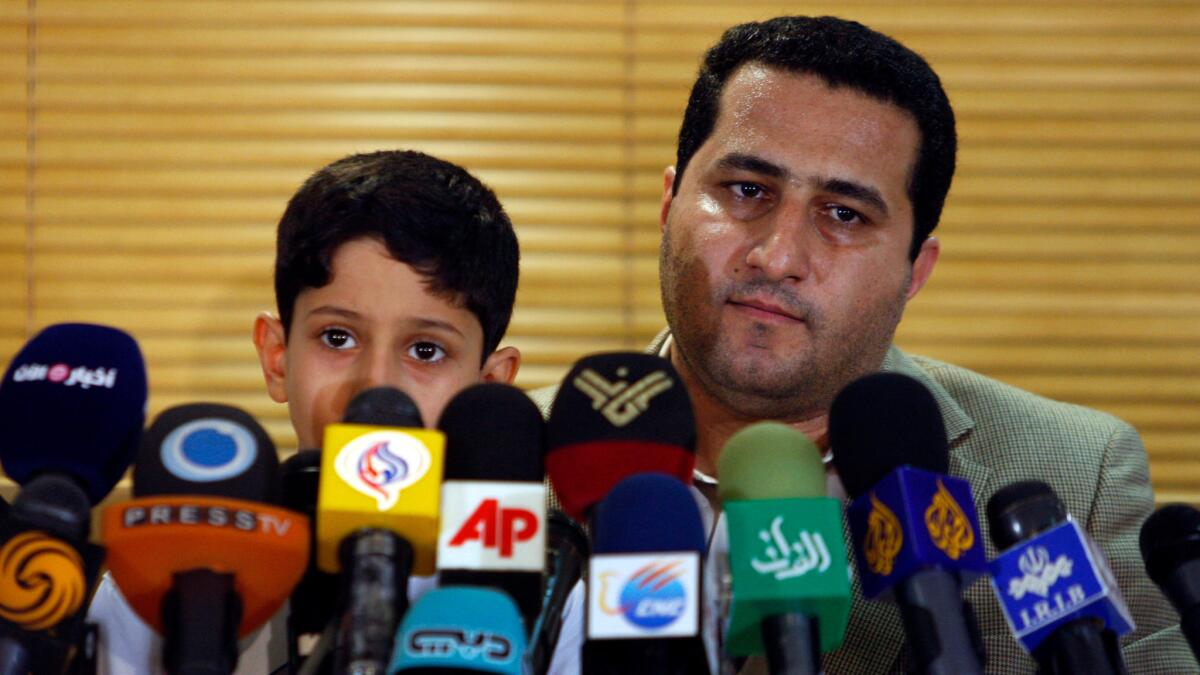Spy saga comes to a close as Iran executes a nuclear scientist accused of giving info to the U.S.

- Share via
Reporting from TEHRAN, Iran — An Iranian scientist who became the center of a real-life spy saga after he was accused of sharing information with the United States about his country’s disputed nuclear program has been executed, officials in Tehran confirmed Sunday.
Shahram Amiri, who disappeared from Iran in 2009, surfaced in the United States and then returned to Tehran to a hero’s welcome a year later, was hanged to death last week, the spokesman for Iran’s judiciary said.
Amiri “was executed after a long and careful trial, and the Supreme Court reviewed and scrutinized his file,” the spokesman, Gholamhosein Mohseni Ejehi, told a weekly news conference.
A day earlier, Amiri’s family told the BBC’s Persian news service that his body had been handed over with rope marks around his neck.
The news ended a long-running mystery over Amiri’s whereabouts since returning to Iran in 2010. He vanished from public view and was widely believed to have been arrested, with family members telling media that he was being held at a secret detention facility.
His apparent defection to the United States in 2009 was seen as a coup for the CIA, which had been trying to get him to spill secrets about a nuclear program that the United States said could be used to develop lethal weapons. Iran, which long maintained that its nuclear program was for peaceful purposes, has agreed to limit uranium enrichment in exchange for an easing of international economic sanctions.
Amiri was working as a researcher for a university that European Union investigators had linked to Iran’s defense ministry and the development of missile technology. He disappeared while on a pilgrimage to Saudi Arabia, and U.S. intelligence officials later disclosed that he had been placed in protective custody and offered millions of dollars to tell the CIA about Iran’s nuclear program.
It was unclear how much information Amiri shared. Some reports have suggested he was not in a senior enough position to know sensitive details about the program.
Analysts speculate that Iran began to threaten Amiri’s family back home. In July 2010, 13 months after he defected, Amiri walked into the Iranian interests section of the Pakistani embassy in Washington and demanded to be repatriated.
I am a simple researcher who was working in the university. I’m not involved in any confidential jobs.
— Shahram Amiri, on his return to Tehran in July 2010
Among the emails that were released last year from Democratic presidential nominee Hillary Clinton’s tenure as secretary of State was a July 12, 2010, note from senior advisor Jake Sullivan that appeared to refer to Amiri a day before his desire to return to Iran became public knowledge.
The email suggested that Amiri had asked U.S. officials to allow him to return to Iran.
“The gentleman has apparently gone to his country’s interests section because he is unhappy with how much time it has taken to facilitate his departure,” Sullivan wrote to Clinton. “This could lead to problematic news stories in the next 24 hours.”
When he returned to Iran, he claimed he had been kidnapped by U.S. and Saudi intelligence officers and tortured by the CIA. Months after being welcomed warmly by relatives and Iranian officials, Amiri went missing again, apparently arrested by Iranian authorities for treason.
Sunday’s disclosure was the first official confirmation of Amiri’s fate. Ejehi, the judiciary spokesman, said Amiri had been executed last Wednesday and said, “I hope the intelligence staff will reveal the true story of this spy.”
Also last Wednesday, Iran said it had put to death 20 people whom it accused of being members of a terrorist cell. Human rights groups condemned the executions of the Sunni Kurdish prisoners as politically motivated and worried they would inflame sectarian tensions.
Iran, an overwhelmingly Shiite Muslim nation, accused Western countries of a “double standard” on terrorism.
Ejehi said those who were executed had “organized terrorist activities leading to death and injuries of scores of innocent people.”
Mostaghim is a special correspondent.
ALSO
Passengers should dress appropriately for a flight, most fliers agree
Protesters say a massacre took place in this Mexican town. Now it’s become a rallying cry
‘Your heart is still bitter,’ infamous killer Betty Broderick is told in parole denial
UPDATES:
2:10 p.m.: Updates throughout with staff reporting.
4:40 a.m.: Updated with background.
This article was first posted at 4:25 a.m.
More to Read
Sign up for Essential California
The most important California stories and recommendations in your inbox every morning.
You may occasionally receive promotional content from the Los Angeles Times.











